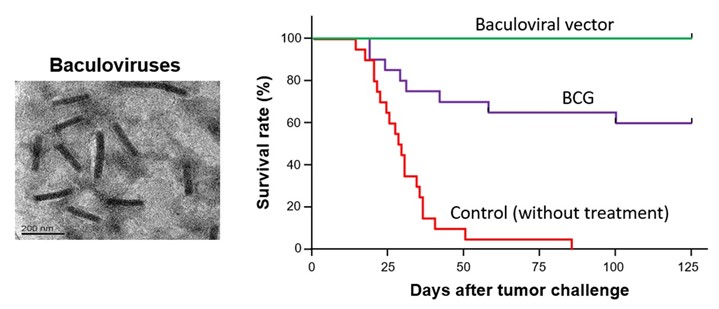Using an insect virus for bladder cancer therapy
NUS biologists used a safe insect virus as gene therapy vectors to treat bladder cancer in mouse tumour models.
To prevent the recurrence of bladder cancer after surgical resection, a drug called Bacillus Calmette-Guerin (BCG) is commonly inserted directly into the patient’s bladder through a catheter (intravesical instillation). BCG is an attenuated bacterium originally developed as a vaccine against tuberculosis. It has been used as an immunotherapy to treat bladder cancer for nearly 40 years. However, the clinical response rate of BCG therapy is only 50 to 70% and many patients fail BCG therapy. There is still no gold standard for salvage therapy after BCG failure.
A research team led by Prof WANG Shu from the Department of Biological Sciences at NUS, in collaboration with clinical doctors at the National University Hospital (NUH) and the National Cancer Centre (NCC), tested animal tumour models to study whether an insect virus called baculovirus can replace BCG in treating bladder cancer. Baculoviruses are found commonly in green vegetables and have been safely used as insecticides against forest and agricultural insects. They hypothesised that baculoviral vectors could offer an unprecedented advantage over BCG and other viral vectors, given their efficient cell transduction capacity in the bladder and intrinsic potent immunostimulatory property.
In seeking evidence to support their hypothesis, they used mouse models of bladder cancer to analyse the cytokine response profiles and immune cell infiltrates associated with intravesical instillation of baculoviruses, and compared the changes with those induced by BCG instillation. To investigate the possibility of using baculovirus as a new intravesical agent for bladder cancer therapy with the dual function of therapeutic vaccination and therapeutic gene delivery, they further examined whether the immune stimulatory effects of an empty baculoviral vector were improved by the use of cytokine-expressing baculoviral gene delivery vectors. They demonstrated that all trial animals treated with the baculoviral vectors survived beyond 12 months, whereas control animals (not treated with the baculoviral vectors) died around two months after tumour inoculation. Thus, baculovirus has the potential to be used as a new agent for bladder cancer therapy, having functions such as stimulating local innate immune reactions, promoting systemic anti-tumour immune responses, and delivering therapeutic genes. The success of this new approach as an adjuvant therapy for urothelial malignancies will benefit bladder cancer patients who fail conventional BCG immunotherapy or who are intolerant of BCG treatment. This combinatorial approach that harnesses the power of immunotherapy and gene therapy in a baculoviral vector suggests that adjuvant treatment can be placed intravesically to make bladder cancer treatment more effective.

Figure shows baculoviruses under an electron microscope (left) and anti-tumour effects of baculoviral gene therapy vectors (right). To test anti-tumour effects, mice were inoculated with tumour cells in the bladder and subsequently treated with baculoviral vectors or BCG. Survival curves until day 125 are shown. [Image credit: Wang Shu]
Reference
Ang WX; Zhao Y; Kwang T; Wu CX; Chen C; Toh HC; Mahendran R; Esuvaranathan K; Wang S*, “Local Immune Stimulation by Intravesical Instillation of Baculovirus to Enable Bladder Cancer Therapy”, SCIENTIFIC REPORTS Volume: 6 Article Number: 27455 DOI: 10.1038/srep27455 Published: 2016
